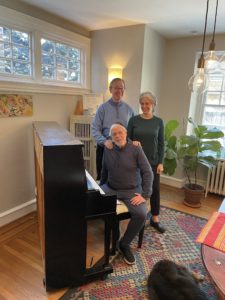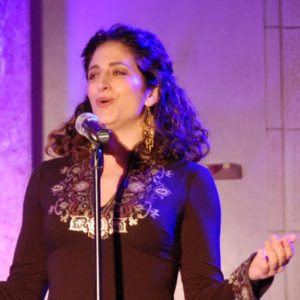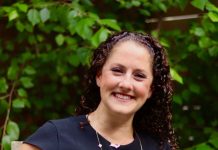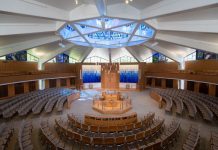
The Yiddish ballad “A brivele der mamen” dates to more than a century ago, written during a time of uncertainty for many Jewish families who became separated; while some braved the journey to Ellis Island to build a new life in the United States, others stayed behind in Eastern European shtetls, awaiting good news and money from their loved ones overseas.
In the song, a mother requests that her son, who recently immigrated to New York, write her a letter to let her know that he’s alive and well — “Nisht farges dayn mamen,” she pleads, “Don’t forget your mother.”
The lesson of the song is similar to that of Harry Chapin’s “Cat’s in the Cradle,” and both espouse the message of the importance of always treasuring the relationship between parent and child, lest it becomes too late.
Though “A brivele der mamen” is more than 100 years old, Temple Adath Israel on the Main Line Cantor Elizabeth Shammash still believes it’s a song that should be heard by today’s audiences and is a reflection of the enduring relevance of Yiddish.
“Yiddish is alive and well,” she said.
Shammash will perform “A brivele der mamen” on March 2 and 3 in Philadelphia as part of “Yiddishe Nightingale,” a multimedia concert celebrating Yiddish music and history. Baltimore-based Beth El Congregation Cantor Thom King and National Yiddish Theatre Folksbiene Artistic Director Zalmen Mlotek will perform alongside Shammash.
The program is part of Philadelphia-based nonprofit Lyric Fest’s 2022 season, meaning it will be heard by both Jewish and non-Jewish audiences.
“We’re thrilled that this is going to reach not only the Jewish community in the environs but also the song community that comes to our concerts to learn new things and hear these stories,” Lyric Fest founder and Artistic Director Suzanne DuPlantis said.
The concert gets its name from “Yiddishe Nightingale,” a song by Irving Berlin that inspired DuPlantis. The program was funded largely in part by Jewish donor Michael Leeds and will be Lyric Fest’s first Yiddish show.
The performance’s broad audience underlies the potential universal impact of Yiddish, performers said.
“Whether they understand the words or not, there’s something about the music; there’s something about the musical themes themselves — based on the modes, based on many, many, many songs that were written as folk songs as just pure expressions of people’s feelings,” Mlotek said.
Though knowledge of Yiddish is not required for attendance, English supertitles will be projected on the stage for each song.
The music performed will range from traditional nignim (melodies) from the mid-1800s to King’s performance of the Yiddish version of “If I Were a Rich Man” from the Folksbiene’s 2018 adaptation of “Fiddler on the Roof.”
Performed in chronological order, the songs reflect 150 years of Yiddish history, Mlotek said: Yiddish songs were performed as part of Purim spiels in Russia and Poland in the mid-19th century and evolved into operettas that reflected life and history.
During the time of Jewish immigration to the U.S., the music, like “A brivele der mamen,” reflected changing family structures, culture and assimilation.
As more Jews assimilated in the U.S., English made its way into Yiddish theater music; in Europe, Jews wrote Yiddish lullabies to soothe their young children enduring the trauma of the Holocaust.
“Each one (song) has its own particular, interesting story,” Mlotek said.
According to Shammash, the music is just as relevant as ever.

“We’re not reviving something dead,” Shammash said. “This issue of immigration is front and center: How do we treat the stranger? How do we welcome the refugee? What was it like under Trump? What is happening now? It’s amazing how it’s absolutely still topical.”
To Shammash and King, both of whom have cantorial backgrounds, learning Yiddish music was a departure from their usual repertoire.
“Yiddish is a folk language. … It’s not liturgical, so much as it is sort of — I like to think of them as devotional pieces,” King said.
Through song, audiences can get the “flavor” of the Yiddish language, Shammash said.
“It’s just such a beautiful, fun, expressive language,” she said. “The music is really the same.”
The concert will take place on March 2 at the Academy of Vocal Arts and on March 3 at Adath Israel. Both performances begin at 7 p.m. The program will debut on March 1 at Beth El Congregation in Baltimore. Proof of COVID vaccination, including a booster shot, is required for entry. The March 3 concert is free for Adath Israel members.
[email protected]; 215-832-0741






